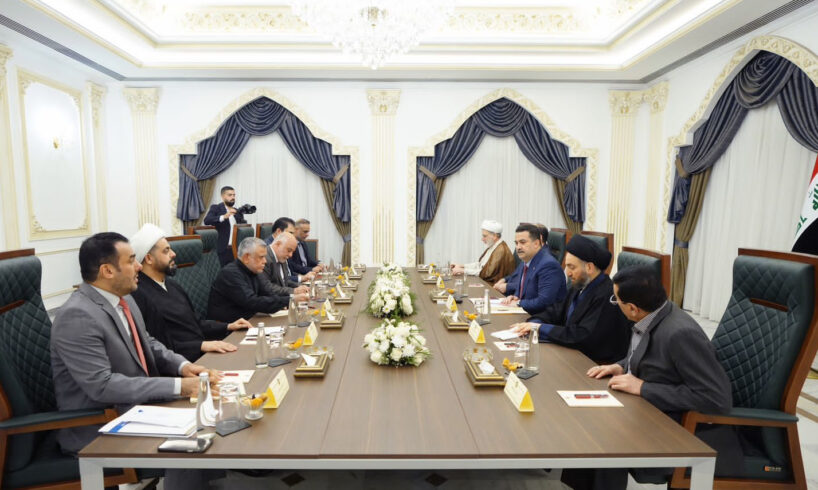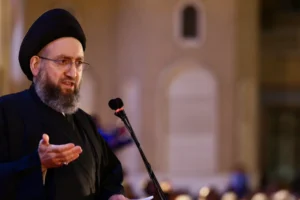
Shafaq
News
With Iraq’s
parliamentary elections set for November 11, 2025, rifts inside the Shiite-led
Coordination Framework (CF) are widening, with accusations traded and no
consensus emerging on core issues, most notably the post of prime minister.
Formed in
October 2021 to block Muqtada al-Sadr’s bid for a majority government, the CF
brings together State of Law, led by former Prime Minister Nouri al-Maliki, the
Fatah Alliance of Hadi al-Amiri, Asaib Ahl al-Haq, headed by Qais al-Khazali,
the al-Hikma Movement of Ammar al-Hakim, the Victory Alliance of Haider
al-Abadi, along with smaller factions such as Faleh al-Fayyadh’s National
Contract, Ahmad al-Asadi’s Bilad Sumer, and others.
The bloc
maintains close ties with Tehran, though its members differ on how far Iraq
should lean toward Iran versus balancing relations with the United States and
Arab Gulf states. These differences underscore the internal tensions that
extend beyond electoral calculations.
However,
what began as a tactical front against Muqtada al-Sadr has long been undermined
by personal rivalries, competition over state resources, and diverging visions
on foreign policy and security.
Past
attempts to bridge disputes allowed the bloc to form governments, but analysts
note a recurring pattern: Shiite blocs come together under external pressure,
but internal rivalries quickly resurface once the threat passes — as seen after
the 2021 elections.
Post-election
scenarios could further test the bloc, with corruption investigations or
political disputes potentially moving into courts — including international
ones — highlighting the fragility of CF cohesion.
Strategic
Schisms
Politicians
within the CF indicate that current disagreements now extend beyond leadership
ambitions. They encompass strategic issues, including relations with Syria
under its new government, ties with Washington, the future of the Popular Mobilization
Forces (PMF), and the status of armed factions.
Some view
PMF weapons as leverage against foreign troops, while others argue the state
must assume full control.
Speaking to
Shafaq News, CF senior official Rahman al-Jazaeri highlighted that Iraq’s
political and economic crises have “deepened the divisions within the
Coordination Framework while also fragmenting the country’s political scene,”
pointing to a clear external hand in fuelling tensions.
Read more: Ground zero in the battle for Iraq’s Parliament
“Sensitive
issues like disarming the resistance and the approval of the PMF Authority Law
were among the reasons for the split inside the Framework,” he added,
underlining that the US pressure remained a major factor.
Observers
note these disputes are hardly new. Iran pushes for cohesion, but in practice,
the Framework has long served as a bargaining platform, not a disciplined
alliance.
The
Re-election Rift
Another
source of tension within the Coordination Framework (CF) is whether Prime
Minister Mohammed Shia al-Sudani should pursue a second term.
Political
analyst Hussein al-Kinani noted that al-Sudani initially pledged not to run
again but later “backtracked on that agreement,” forming the Reconstruction and
Development Coalition—which includes his Euphrates Movement (al-Furatain) along
with seven other political forces.
The move
placed strain on the CF, which had been central to al-Sudani’s rise to power,
prompting some factions to even harden their stance.
On April 21,
the CF decided to contest the next elections under multiple lists that would
later merge into a post-vote bloc—a strategy that highlights both the need for
unity and the difficulty of sustaining it amid internal rivalries.
This
approach is familiar in Shiite politics, where blocs often run separately to
test their strength before negotiating post-election power-sharing. These
widening disputes led key players, including State of Law, Asaib Ahl Al-Haq,
and al-Hikma, to field separate lists, while keeping the door open for
post-election reconciliation.
Electoral
arithmetic adds another layer of complexity. In 2021, State of Law captured
roughly 33 seats, Fatah 17, al-Hikma just 2, and Asaib-linked candidates 4–6,
with independents gradually chipping away at the Shiite vote.
Public
fatigue with familiar parties was also evident in the December 2023 provincial
elections, which recorded only 45% turnout—further intensifying rivalries as
leaders maneuver for leverage in post-election negotiations.
Unsettled
Scores
Rahim
al-Darraji, head of the Kafa Movement, argued that the CF never fully resolved
the old rifts dating back to its opposition days, when the bloc held roughly 40
parliamentary seats and operated outside the government coalition following the
2018 elections.
Electoral
competition, he told Shafaq News, remains the main driver of the current
splits. “Each party sees its interest separately and wishes to weaken its
rivals,” he explained, noting that this dynamic has further widened the divide.
Al-Darraji
further suggested that the divisions could carry a silver lining if they lead
to the exposure of corruption files, potentially benefiting citizens. Yet he
remained skeptical about the bloc’s prospects, stressing that Prime Minister
Mohammed Shia Al-Sudani “has no real chance.”
“The current
rallying around his list is about office, votes, and money. His bloc will
unravel after the election, as Haider al-Abadi did previously,” he added.
‘’Control
over key offices lies at the heart of intra-CF bargaining,’’ making the CF
split almost inevitable, al-Darraji noted.
Disputes
Downplayed
In contrast,
Fadi al-Jubouri of al-Hikma Movement minimized any notion of a CF rupture,
labeling talk of splits as “exaggerated.”
He pointed
out to Shafaq News that regular CF meetings continue and differences largely
stem from divergent views or statements rather than fundamental divisions.
Al-Jubouri
also highlighted that the bloc will run on 12 lists, yet with “agreements”
designed to preserve the CF’s structure and pave the way for
institutionalization through a general assembly and leadership council.
“There is
consensus inside the Framework on strategic decisions related to the state,
government, political system, and external relations with Iran and the US,” he
emphasized, stressing that these constants remain insulated from political
quarrels.
Whether the
CF holds after November will hinge on whether its factions prioritize
collective influence over individual ambition. History suggests the bloc rarely
dissolves outright, but instead reshapes itself in cycles of rivalry and
reconciliation, shaped by elections and external pressures.
Written and
edited by Shafaq News staff.





